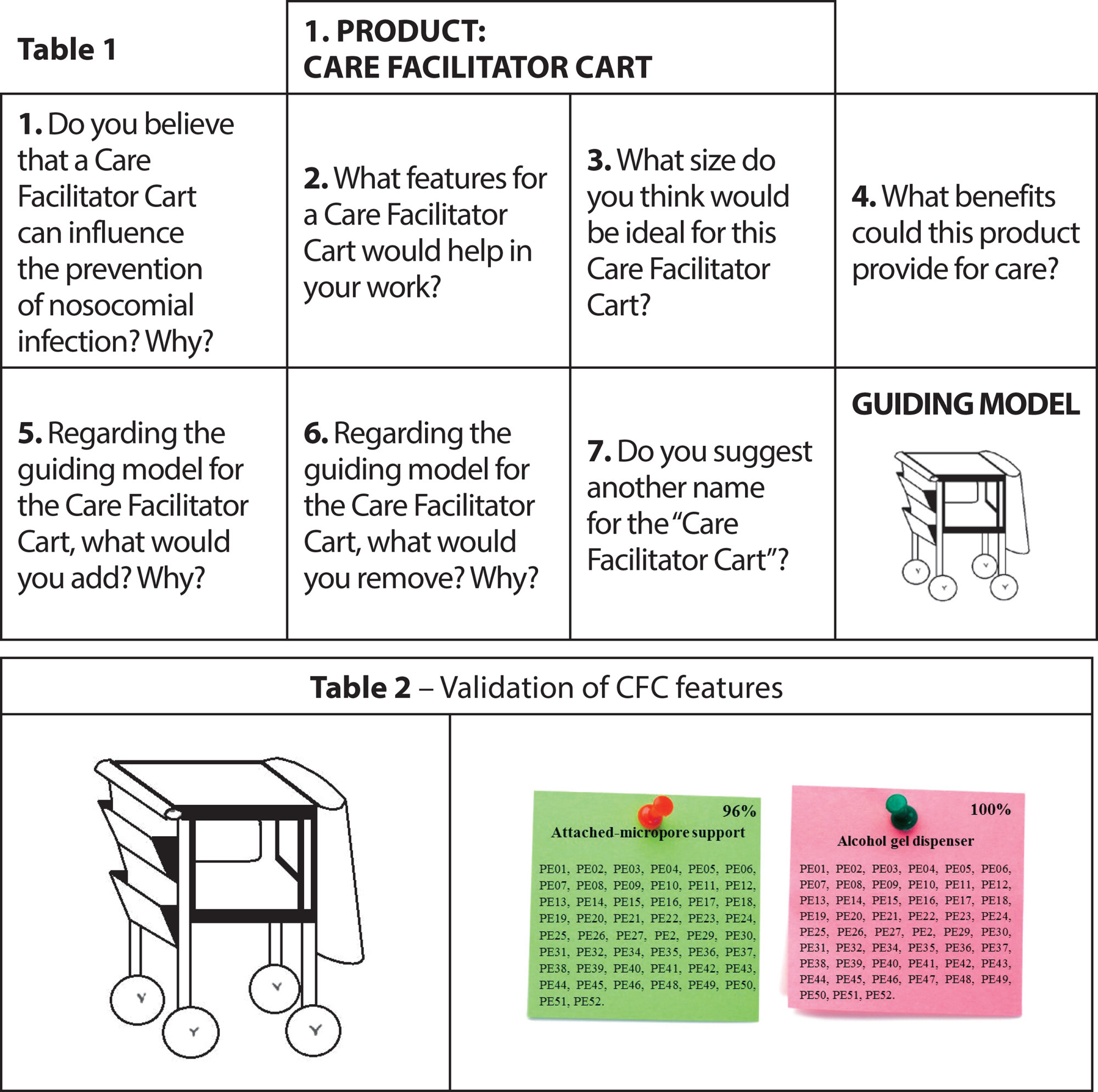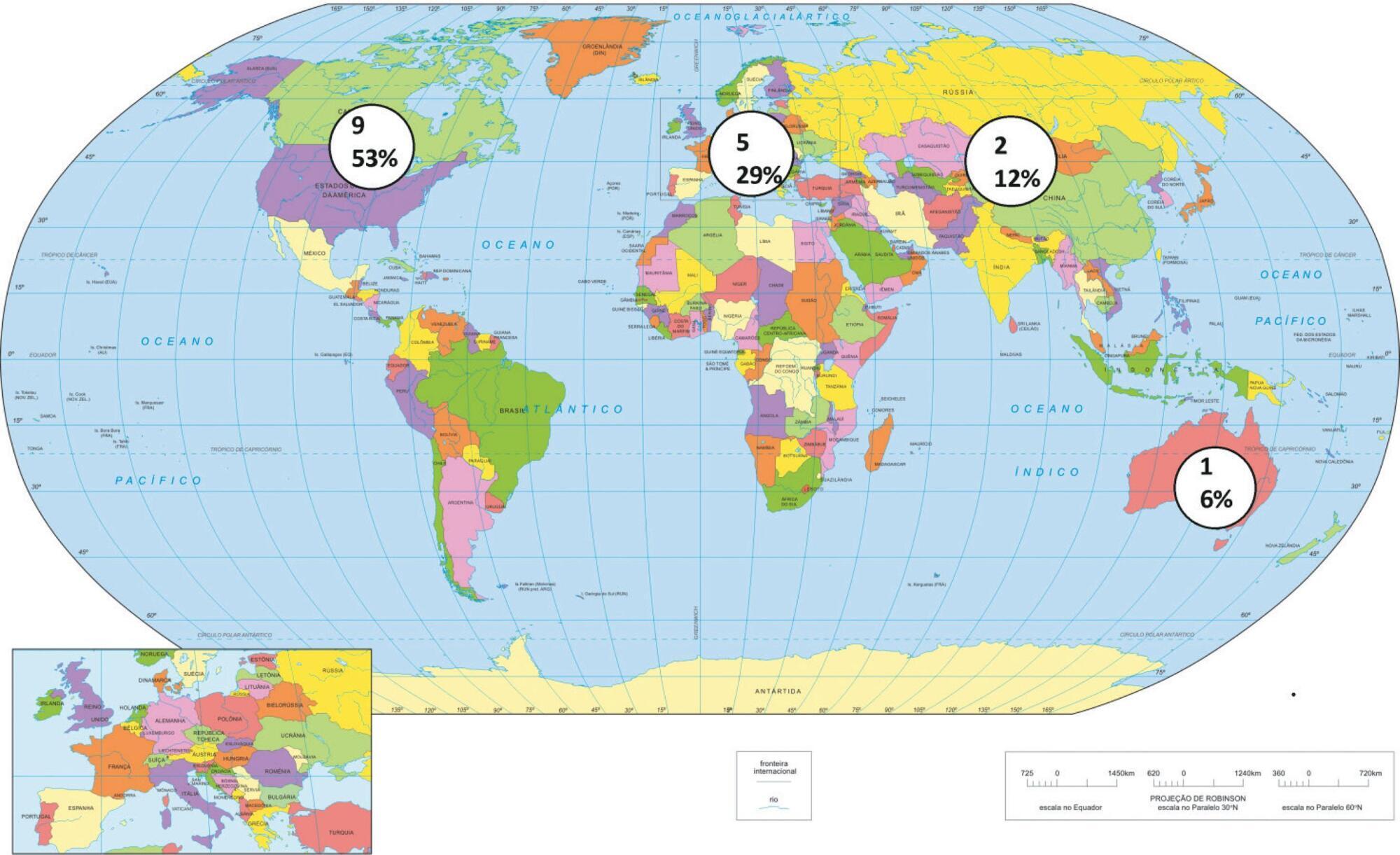-
ORIGINAL ARTICLE
Elaboration and validity of the Instrumento para Avaliação de Modelos metodológicos voltados ao Desenvolvimento de Tecnologias
Revista Brasileira de Enfermagem. 2023;76(Suppl 4):e20230046
11-13-2023
Resumo
ORIGINAL ARTICLEElaboration and validity of the Instrumento para Avaliação de Modelos metodológicos voltados ao Desenvolvimento de Tecnologias
Revista Brasileira de Enfermagem. 2023;76(Suppl 4):e20230046
11-13-2023DOI 10.1590/0034-7167-2023-0046
Visualizações0ABSTRACT
Objective:
to elaborate and validate the Instrumento para Avaliação de Modelos metodológicos voltados ao Desenvolvimento de Tecnologias.
Methods:
a methodological study, developed in three stages: instrument structuring through documentary research and researchers’ expertise; instrument validity with a panel of 11 expert judge nurses; and instrument final composition.
Results:
the instrument, after validity by experts, consisted of 30 items, divided into the content (26 items) and appearance (four items) domains. In the initial instrument validity process, 11 items were modified and seven were withdrawn, as they had a percentage of agreement below 0.80. The instrument showed excellent internal consistency, with values greater than 0.90 in its psychometric criteria.
Conclusion:
the instrument produced and validated aimed at assessing research methodological models for technological development showed good reliability, and may contribute to the methodological rigor of technological development research in nursing.
Palavras-chave: NursingNursing Methodology ResearchPsychometricsSurveys and QuestionnairesTechnological DevelopmentVer mais -
ORIGINAL ARTICLE
Development of an appearance validity instrument for educational technology in health
Revista Brasileira de Enfermagem. 2020;73(suppl 6):e20190559
12-21-2020
Resumo
ORIGINAL ARTICLEDevelopment of an appearance validity instrument for educational technology in health
Revista Brasileira de Enfermagem. 2020;73(suppl 6):e20190559
12-21-2020DOI 10.1590/0034-7167-2019-0559
Visualizações0ABSTRACT
Objectives:
to develop and evaluate the convergence of the instrument for the appearance validity of educational technologies in health.
Methods:
methodological study conducted in two steps. In step 1, the instrument items were developed, with subsequent content validity by nine specialists in the development of educational technologies in health. In step 2, the convergent validity between another instrument and the appearance instrument was performed. Correlation results above r> 0.3 and p <0.05 were considered as plausible convergent validity.
Results:
the ten items of the initial version of the appearance instrument were submitted to content validity that resulted in a final version with 12 items (Content Validity Index = 0.93). The correlation indexes were strong with the objective and appearance domains; moderate with motivation, organization and total; and weak with writing style.
Conclusions:
the appearance instrument demonstrated content validity and convergent validity, in addition to a strong correlation with the other instrument.
Palavras-chave: Educational TechnologyHealth EducationMethodological Research in NursingTechnological DevelopmentValidation StudiesVer mais -
ORIGINAL ARTICLE
Care Facilitator Cart: a product technology built with nursing professionals
Revista Brasileira de Enfermagem. 2020;73(suppl 6):e20190741
12-21-2020
Resumo
ORIGINAL ARTICLECare Facilitator Cart: a product technology built with nursing professionals
Revista Brasileira de Enfermagem. 2020;73(suppl 6):e20190741
12-21-2020DOI 10.1590/0034-7167-2019-0741
Visualizações0ABSTRACT
Objectives:
to describe a product technology building (Care Facilitator Cart) with nursing professionals working in surgical clinic and medical clinic at a university hospital in Rio Grande do Sul.
Methods:
a qualitative, methodological research guided by the Business Model Canvas, with 52 nursing professionals, through non-participant observation and brainstorming, carried out from April to October 2016. The records were analyzed through content analysis.
Results:
the product was built with two floors, a retractable table, a removable compartment for disposal and separation of infectious, recyclable and sharps waste, lid opening by a sensor, among others.
Final Considerations:
the invention unleashes possibilities to be an innovative instrument aimed at performing safe care in hospital institutions, with a view to reducing professional wear, rework, infection control, and effectiveness of procedures and techniques.
Palavras-chave: Hospital CareNurse PractitionersNursing CareProducts TechnologyTechnological DevelopmentVer mais
-
REVISÃO
Nursing performance in robotic surgeries: integrative review
Revista Brasileira de Enfermagem. 2019;72(3):795-800
06-07-2019
Resumo
REVISÃONursing performance in robotic surgeries: integrative review
Revista Brasileira de Enfermagem. 2019;72(3):795-800
06-07-2019DOI 10.1590/0034-7167-2018-0426
Visualizações0ABSTRACT
Objective:
To know the scientific production on the performance of the nursing staff in robotic surgeries, identifying the role of the nurse in the three perioperative periods.
Methods:
Integrative review, search in the databases National Library of Medicine, National Institutes of Health, Scientific Electronic Library Online and Biblioteca Virtual em Saúde, performed from June to September, 2017; 17 selected articles met the inclusion criteria.
Results:
Most articles were published in foreign journals in English, nine in the United States, classified with evidence level of 4 and 5. The role of nursing in the perioperative period was identified, related mainly to patient safety. The most mentioned perioperative period in the articles was the intraoperative, with greater concern in the positioning of the patient.
Conclusion:
The nursing performance and patient safety in robotic surgeries are similar to the ones in major surgeries, requiring from the patient a specific knowledge on the setting and preparation of the robot.
Palavras-chave: Nurse's RolePerioperative NursingRoboticsSurgical Procedures, OperativeTechnological DevelopmentVer mais
-
REFLECTIVE
A paradigmatic visionary perspective: professional master’s in nursing
Revista Brasileira de Enfermagem. 2018;71(5):2584-2588
01-01-2018
Resumo
REFLECTIVEA paradigmatic visionary perspective: professional master’s in nursing
Revista Brasileira de Enfermagem. 2018;71(5):2584-2588
01-01-2018DOI 10.1590/0034-7167-2018-0102
Visualizações0ABSTRACT
Objective:
To reflect on the key concepts of the book The Structure of Scientific Revolutions and its applicability in professional master's in nursing.
Method:
This is a theoretical-reflective study that uses the philosophical and epistemological conceptions of the philosopher Thomas Samuel Kuhn to consider its applicability on the paradigm shift of stricto sensu graduate courses in nursing. The main concepts of Kuhn were used as support: paradigm, anomaly, scientific community and scientific revolution.
Results:
The propositions of this philosopher are applied to and support the theoretical reflection on professional master's programs, contributing to clarify what would be a paradigmatic visionary perspective in stricto sensu master's models in nursing.
Conclusion:
From Kuhn's propositions it was possible to conclude that professional master's programs in nursing can break away from the dominant paradigm, strengthening a scientific revolution within the academia.
Palavras-chave: Education, Nursing, GraduateEducation, ProfessionalHealth Postgraduate ProgramsNursingTechnological DevelopmentVer mais -
PESQUISA
Learning Incubator: an instrument to foster entrepreneurship in Nursing
Revista Brasileira de Enfermagem. 2015;68(6):1103-1108
01-01-2015
Resumo
PESQUISALearning Incubator: an instrument to foster entrepreneurship in Nursing
Revista Brasileira de Enfermagem. 2015;68(6):1103-1108
01-01-2015DOI 10.1590/0034-7167.2015680615i
Visualizações0Ver maisABSTRACT
Objective:
this study aimed to know the contributions of the Learning Incubator to the process of lifelong education in health.
Method:
this is a qualitative field research whose data was collected from August to December 2014 by the focus group technique. The research had 34 employees of a Teaching Hospital in the central region of the state of Rio Grande do Sul that participated previously in the incubation process.
Results:
from the data encoded by content analysis, three themes were selected: Learning Incubator – welcoming and integrating space; An instigating instrument that enhances possibilities; Continuous and lifelong education strategy.
Conclusion:
the Learning Incubator is an important instrument to foster entrepreneurship in nursing and other health areas due to its capacity of rethinking mechanized practices, to the possibility of instigating new ways of being and acting, and to the ability of creating and developing new ideas based on individual and institutional needs.



